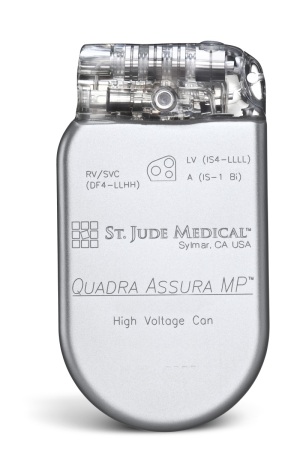por
John R. Fischer, Senior Reporter | January 09, 2018

Quadra Assura MP Cardiac
Resynchronization Therapy Defibrillator
Abbott’s Quadra Assura MP Cardiac Resynchronization Therapy Defibrillator (CRT-D) and Fortify Assura Implantable Cardioverter Defibrillator (ICD) will now come with MR-conditional labeling following FDA approval.
The nod from the FDA toward labeling enables patients in need of an ICD or a CRT-D to acquire one with less worry and anxiety in undergoing MR imaging procedures, and greater specification to ensure safety during such exams in the future.
“It is important that all devices are safe and continue to function as intended in the various environments patients are exposed to,” Avi Fischer, divisional vice president of medical affairs and medical director of Abbott's cardiac rhythm management business, told HCB News. “We have made great advancements in imaging and device-based technologies and therefore, we need to ensure that patients who are receiving these treatments are safe. We also need to make sure that we are designing medical devices with true risk in mind. We need efforts to affirm what we see in the literature.”



Ad Statistics
Times Displayed: 75267
Times Visited: 5317 MIT labs, experts in Multi-Vendor component level repair of: MRI Coils, RF amplifiers, Gradient Amplifiers Contrast Media Injectors. System repairs, sub-assembly repairs, component level repairs, refurbish/calibrate. info@mitlabsusa.com/+1 (305) 470-8013
The approvals are just two of many for Abbott, which has also received the same consent for its
Assurity MRI pacemaker,
Ellipse ICD and associated MRI-compatible leads. It also
received CE approval in December 2016 for full body MR-conditional labeling for its Proclaim Elite Spinal Cord Stimulation.
In addition to labeling, Abbott’s Fortify Assura ICD and Quadra Assura MP CRT-D are equipped with other innovations to ensure safety, including its TailoredTherapy features, which protect against the application of unnecessary therapy and continuously monitor the condition of a lead to ensure proper delivery of appropriate therapy. The CRT-D also utilizes Abbott’s SynvAV software which adjusts therapy based on real-time changes it detects in a patient’s cardiac condition.
Fischer says that while MR-conditional labeling can be useful in relieving fear and anxiety, it is greatly believed that all cardiac implantable electronic devices (CIEDs), with or without labels, are safe for MR scanning.
“The evidence continues to support the fact that all CIEDs are safe in the MR environment when scanned using the proper protocols,” he said. “It is widely appreciated by the clinical community that this is the case even for those devices without specific MR labeling.”

